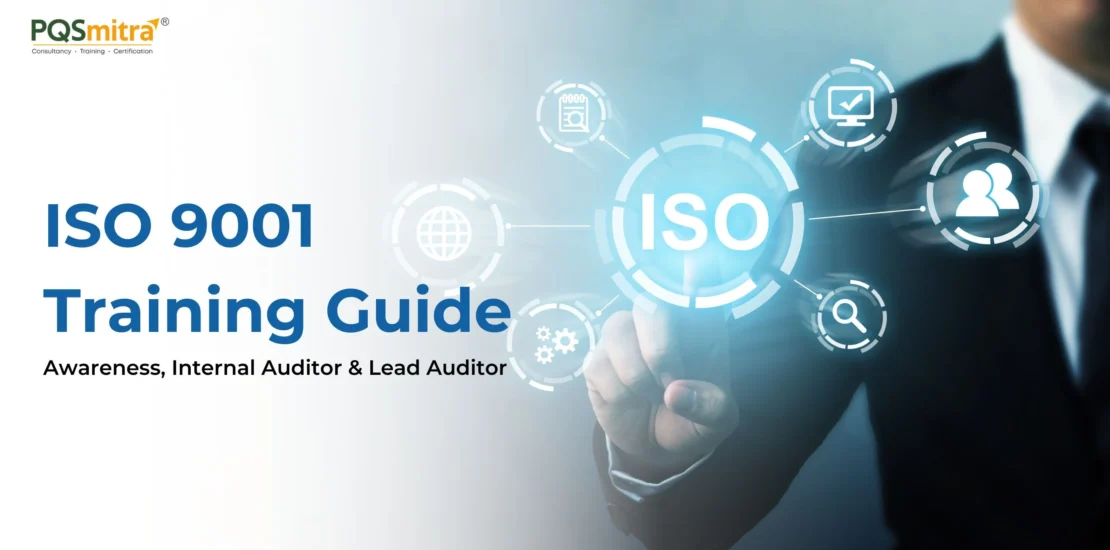- December 5, 2024
- Posted by: PQS_Mitra_Main_Access
- Categories:

Introduction
Quality is not just a department—it’s a culture. For organizations around the world, maintaining high standards of quality is both a strategic advantage and a customer expectation. At the heart of many quality management systems lies ISO 9001, the internationally recognized standard for quality management. It provides a framework for organizations to consistently deliver products and services that meet customer and regulatory requirements.
However, simply having a quality policy on paper isn’t enough. What makes ISO 9001 effective is how well people within the organization understand and implement its principles. That’s where structured training comes in. Whether you’re looking to build awareness, train internal auditors, or qualify lead auditors, each level of ISO 9001 training plays a distinct role in supporting a strong quality culture.
Understanding the Levels of ISO 9001 Training
ISO 9001 training isn’t a one-size-fits-all program. Different roles and responsibilities within the organization require different levels of understanding. The three core training pathways are:
- Awareness Training
This is ideal for all employees. Awareness training introduces the fundamentals of ISO 9001, including its purpose, key principles, and benefits. It ensures everyone understands how their roles contribute to quality objectives, even if they’re not directly involved in audits or documentation. - Internal Auditor Training
Aimed at individuals responsible for conducting internal audits, this training dives deeper into interpreting ISO 9001 clauses and applying audit techniques. It equips participants with the skills to plan, conduct, report, and follow up on audits within the organization, ensuring continuous improvement. - Lead Auditor Training
This is designed for those who will lead audit teams or conduct external audits on behalf of certification bodies. It covers ISO 9001 in-depth, audit principles, communication skills, and leadership during audits. Lead auditors play a crucial role in validating an organization’s quality management system.
Each level builds on the other, creating a well-rounded, informed, and capable quality management team.
Why Training Makes a Tangible Difference
Implementing ISO 9001 is not about checking boxes. It’s about embedding quality into everyday operations. To do this effectively, employees and auditors need to understand both the why and how behind quality processes.
Training supports:
- Better Compliance: Employees are more likely to follow procedures correctly when they understand the purpose behind them.
- Audit Readiness: Trained internal auditors help the organization stay prepared for external audits, reducing non-conformities and improving outcomes.
- Stronger Process Control: When staff are trained, they can identify gaps, suggest improvements, and respond proactively to quality issues.
- Increased Consistency: Quality training ensures everyone interprets and applies ISO 9001 requirements the same way, reducing variability.
- Data-Driven Improvements: Auditors trained to assess performance can provide insights that help management make informed decisions.
This kind of clarity and consistency is what sets successful ISO 9001 systems apart from those that exist only on paper.
Training Is an Investment, Not an Option
Often, organizations underestimate the impact of properly trained teams on the effectiveness of ISO 9001 implementation. It’s not enough to rely on a few quality champions; instead, everyone must have a basic understanding of quality requirements. Meanwhile, skilled internal auditors are crucial for keeping the system sharp, and lead auditors provide the strategic oversight needed for continual compliance and improvement.
The right training empowers your team to not only understand the ISO 9001 standard but to live it through their daily actions and decisions. When this mindset is embedded throughout the company, quality becomes part of the organizational DNA.
The Role of Training
ISO 9001 training sessions—delivered either online or onsite—help organizations scale their quality efforts effectively. Here’s what a typical program might cover:
- Awareness Sessions focus on the seven quality management principles, process approach, and the benefits of a quality management system.
- Internal Auditor Programs introduce ISO 19011 (guidelines for auditing), audit planning, execution, and reporting, with role-play and practical insights.
- Lead Auditor Training equips participants with full-spectrum audit competencies, including managing audit teams and dealing with complex scenarios.
Such training fosters alignment across departments and helps develop a shared language of quality. It also ensures that documentation, risk analysis, and corrective actions are handled consistently across the board.
Conclusion
ISO 9001 is more than a certification—it’s a commitment to excellence. And that commitment starts with understanding. From awareness to auditing, structured training ensures that your team isn’t just following a standard—they’re championing it.
Effective training builds confidence, improves audit outcomes, and strengthens organizational processes. It’s one of the smartest investments a company can make in its quality journey.
PQSmitra offers ISO 9001 training programs tailored to the needs of modern organizations. Whether you’re looking to upskill your workforce or prepare your team for internal or external audits, our structured, certification-backed programs are designed to support both online and onsite delivery modes—giving you the flexibility and expertise you need to maintain excellence in quality.
Leave a Reply Cancel reply
Kindly submit a business inquiry online and we will get back to you!
OR
Call us on 022-2893 8687 | +91-9820204373
